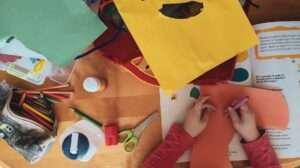In today’s fast-paced and often chaotic world, many individuals find themselves feeling lost and without a sense of purpose. This feeling of purposelessness can have a significant impact on mental health, leading to feelings of emptiness, depression, and anxiety. It is crucial for individuals to find a sense of purpose in their lives, as it provides a sense of direction, fulfillment, and overall well-being.
Key Takeaways
- Feeling purposeless can lead to negative emotions and a lack of motivation
- Finding purpose in life can bring fulfillment and a sense of direction
- Exploring passions and interests can help uncover potential areas of purpose
- Identifying strengths and weaknesses can guide the pursuit of purpose
- Seeking guidance from mentors or counselors can provide valuable insight and support
Understanding the feeling of purposelessness
Purposelessness can be defined as a lack of direction or meaning in one’s life. It is a feeling of being adrift, without a clear sense of purpose or goals. There are several factors that can contribute to this feeling, including societal pressures, personal setbacks, and a lack of self-awareness. Signs of purposelessness may include feelings of apathy, lack of motivation, and a general sense of dissatisfaction with life.
The importance of finding purpose in life
Having a sense of purpose is essential for overall well-being and mental health. When individuals have a clear sense of purpose, they are more likely to experience higher levels of happiness, satisfaction, and fulfillment in their lives. Purpose provides individuals with a reason to get out of bed in the morning and gives them a sense of direction and meaning. It can also help individuals overcome obstacles and setbacks, as they have something to strive for and work towards.
There are numerous examples of individuals who have found their purpose in life and have experienced significant benefits as a result. For example, Mother Teresa dedicated her life to helping the poor and marginalized, and her sense of purpose gave her the strength and motivation to continue her work despite the challenges she faced. Similarly, Steve Jobs found his purpose in creating innovative technology that would change the world, and his passion for his work fueled his success.
Exploring your passions and interests
One way to find your purpose in life is by exploring your passions and interests. Knowing what you are passionate about can provide you with a sense of direction and fulfillment. Take the time to reflect on what activities bring you joy and make you feel alive. Consider what topics or hobbies you find yourself constantly drawn to, and explore ways to incorporate them into your life.
There are various ways to explore your passions and interests. You can start by trying out new activities or hobbies that align with your interests. Take a class, join a club, or volunteer for an organization that focuses on something you are passionate about. This will not only allow you to explore your interests further but also provide opportunities for personal growth and connection with others who share similar passions.
Once you have identified your passions, you can begin to turn them into a purpose. Think about how you can use your interests to make a positive impact in the world or help others. For example, if you are passionate about animals, you could volunteer at an animal shelter or start a pet-sitting business. By aligning your passions with a greater purpose, you can find a sense of meaning and fulfillment in your life.
Identifying your strengths and weaknesses
Knowing your strengths and weaknesses is another important step in finding your purpose. Understanding what you excel at and what areas you may need to work on can help guide you towards a path that aligns with your abilities and values.
There are several ways to identify your strengths and weaknesses. One approach is to reflect on past experiences and take note of the tasks or activities that came naturally to you and those that were more challenging. You can also ask for feedback from friends, family, or colleagues who know you well. Additionally, there are various online assessments and tools available that can help identify your strengths and weaknesses.
Once you have identified your strengths, think about how you can use them to make a positive impact in the world. For example, if you are a natural leader, consider how you can use your leadership skills to inspire and motivate others. By leveraging your strengths, you can find a sense of purpose and fulfillment in your life.
Seeking guidance from mentors or counselors

Seeking guidance from mentors or counselors can be incredibly helpful in finding your purpose. These individuals can provide valuable insights, support, and guidance as you navigate your journey towards finding meaning and fulfillment in your life.
There are various types of mentors or counselors you can seek, depending on your needs and preferences. A mentor can be someone who has already found their purpose and can provide guidance based on their own experiences. A counselor, on the other hand, can help you explore your thoughts and feelings more deeply and provide support as you navigate the challenges of finding your purpose.
Mentors or counselors can help you find your purpose by asking thought-provoking questions, providing feedback and guidance, and offering support and encouragement. They can also help you gain clarity on your values, strengths, and passions, and assist you in developing a plan of action to achieve your goals.
Taking risks and trying new things
Taking risks and trying new things is an important part of finding your purpose. Stepping out of your comfort zone allows you to explore new opportunities, discover new passions, and grow as an individual.
Taking risks can be intimidating, but it is often through these experiences that we learn the most about ourselves and what truly matters to us. It is important to remember that failure is a natural part of the process and should not be seen as a setback but rather as an opportunity for growth.
There are several ways to step out of your comfort zone. You can start by setting small goals or challenges for yourself that push you outside of your comfort zone. This could be something as simple as striking up a conversation with a stranger or trying a new type of exercise class. As you become more comfortable with taking risks, you can gradually increase the level of challenge and try new experiences that align with your interests and passions.
Trying new things can help you find your purpose by exposing you to new ideas, perspectives, and opportunities. It can also help you discover new passions and interests that you may not have been aware of before. By embracing new experiences, you open yourself up to a world of possibilities and increase your chances of finding a sense of purpose and fulfillment.
Practicing self-reflection and mindfulness
Practicing self-reflection and mindfulness is an essential part of finding your purpose. Taking the time to reflect on your thoughts, feelings, and experiences can provide valuable insights into what truly matters to you and what brings you joy and fulfillment.
There are various ways to practice self-reflection and mindfulness. You can start by setting aside dedicated time each day or week for self-reflection. This could be as simple as taking a few minutes each morning to journal or meditate. During this time, reflect on your goals, values, and passions, and consider how they align with your current life circumstances.
Mindfulness practices such as meditation or deep breathing exercises can also help you become more present in the moment and cultivate a sense of clarity and focus. By practicing mindfulness, you can become more attuned to your thoughts and feelings, which can help guide you towards finding your purpose.
Self-reflection and mindfulness can help you find your purpose by allowing you to tune into your inner desires, values, and passions. By becoming more aware of what truly matters to you, you can make decisions that align with your authentic self and lead a more purposeful and fulfilling life.
Finding meaning in everyday activities
Finding meaning in everyday activities is an important part of finding your purpose. It is not always necessary to make grand gestures or achieve monumental goals in order to find fulfillment in life. Sometimes, it is the small moments and everyday actions that bring the most joy and meaning.
There are several ways to find meaning in everyday activities. One approach is to practice gratitude and appreciation for the simple pleasures in life. Take the time to notice and savor the small moments of joy, such as a beautiful sunset or a heartfelt conversation with a loved one. By cultivating a sense of gratitude, you can find meaning and purpose in even the most mundane tasks.
Another way to find meaning in everyday activities is by aligning them with your values and passions. Consider how you can infuse your daily routines with activities that bring you joy and fulfillment. For example, if you are passionate about art, you could incorporate a daily drawing or painting practice into your routine. By finding meaning in everyday activities, you can experience a greater sense of purpose and fulfillment in your life.
Creating goals and setting intentions
Creating goals and setting intentions is an important step in finding your purpose. Goals provide a sense of direction and motivation, while intentions help guide your actions and decisions towards what truly matters to you.
When creating goals, it is important to ensure they are aligned with your values, passions, and strengths. Reflect on what you want to achieve in different areas of your life, such as career, relationships, health, and personal growth. Set specific, measurable, achievable, relevant, and time-bound (SMART) goals that will help you move closer to finding your purpose.
Setting intentions involves identifying the qualities or values you want to embody in your daily life. For example, if one of your values is compassion, you can set an intention to practice acts of kindness towards yourself and others each day. By setting intentions, you can cultivate a sense of purpose and mindfulness in your actions.
Creating goals and setting intentions can help you find your purpose by providing a roadmap for achieving what truly matters to you. They serve as a reminder of what you are working towards and help keep you focused and motivated along the way.
Embracing the journey of discovering your purpose
Embracing the journey of discovering your purpose is an important mindset to adopt. It is important to remember that finding your purpose is not a destination but rather a lifelong journey. It is a process of self-discovery, growth, and exploration.
Embracing the journey involves being open to new experiences, being willing to learn from setbacks and failures, and being patient with yourself as you navigate the ups and downs of finding your purpose. It is about embracing the unknown and trusting that the path will unfold as it should.
There are several ways to embrace the journey of discovering your purpose. One approach is to practice self-compassion and kindness towards yourself. Recognize that finding your purpose takes time and effort, and that it is okay to make mistakes along the way. Treat yourself with love and understanding as you navigate this process.
Another way to embrace the journey is by seeking support from others. Surround yourself with individuals who support and encourage you in your quest for purpose. Share your experiences, challenges, and successes with others who can provide guidance and understanding.
Embracing the journey of discovering your purpose can help you find a sense of peace and fulfillment in the present moment. By letting go of the need for certainty and control, you can open yourself up to new possibilities and experiences that may lead you towards your purpose.
Finding a sense of purpose in life is crucial for overall well-being and mental health. It provides individuals with a sense of direction, fulfillment, and meaning. By exploring passions and interests, identifying strengths and weaknesses, seeking guidance from mentors or counselors, taking risks, practicing self-reflection and mindfulness, finding meaning in everyday activities, creating goals and setting intentions, and embracing the journey of discovering one’s purpose, individuals can find a greater sense of fulfillment and happiness in their lives.
It is important to take action towards finding your purpose and not wait for it to magically appear. Start by exploring your passions and interests, reflecting on your strengths and weaknesses, and seeking guidance from mentors or counselors. Take risks, practice self-reflection and mindfulness, find meaning in everyday activities, create goals and set intentions, and embrace the journey of discovering your purpose. Remember that finding your purpose is a lifelong journey, and it is never too late to start.

















Add Comment